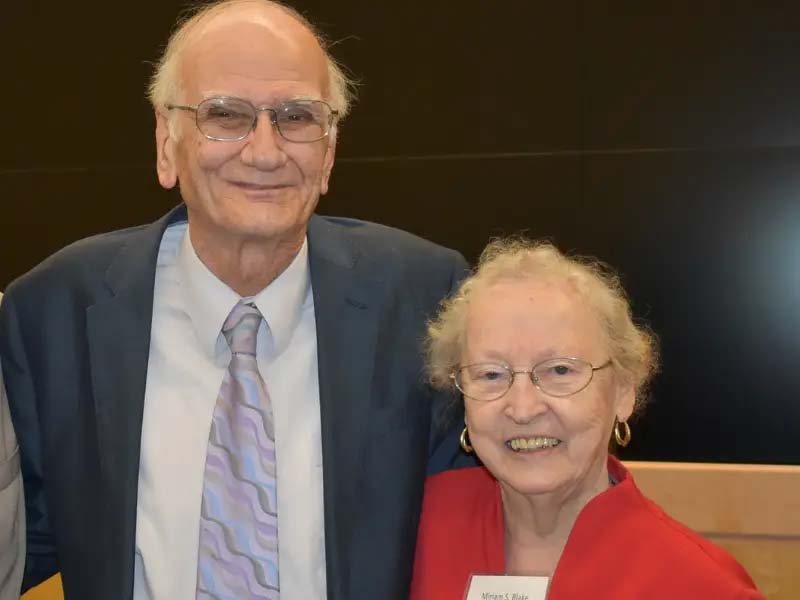The History of Christianity: Looking Back and Looking Forward
April 8, 2021

Nearly three decades ago students, friends, and family of Dr. William (Bill) and Mrs. Miriam Blake endowed the Blake Lectures in the History of Christianity. The lectures, which host leading scholars of Christianity from all periods, traditions, and regions, honor the Blakes and Dr. Blake’s long career teaching since VCU’s founding, and even before that at Richmond Professional Institute. If you have ever seen Dr. Blake teach, which he has continued to do since his retirement, the devotion and esteem of his students will come as no surprise. As part of a Blake Speakers Series in 2017 commemorating the 500th anniversary of Luther’s 95 Theses (and thus the start of the Reformation) Dr. Blake gave a lecture on the Anabaptists and the radical reformers, and it was quite a sight: young college students in rapt attention as an octogenarian Dr. Blake lectured for over two hours without a break, without a seat, and without notes, a model of excellence in college teaching still worth emulating.
This year’s lecture, presented on March 18 and now available online for those who missed it, was presented by Professor Susan Holman of Valparaiso University. Entitled “Peregrine Palimpsests: Medical-Religious Border Crossing in the Lives and Luggage of Three Monks,” the lecture traced the lives and afterlives of monks who crossed borders of the Roman empire east and west, bringing with them books, practices, and ideas about medicine, theology, and holiness.
The first presenter of the lectures, Martin Marty of the University of Chicago, was among the most prominent postwar chroniclers of American religious history, especially Protestantism, which he also documented and interrogated through his decades of editing the weekly “mainstream” Protestant magazine The Christian Century. The mainstream American Protestantism studied by Marty, and ministered to by Dr. Blake as well, has come to a critical historical moment. A recent Gallup poll shows a dramatic drop in church, synagogue, and mosque attendance over the past 20 years. From a rate that had held relatively steadily at around 70% from the 1940s to the millennium, church attendance has dropped to only 47% by 2020. This is an astonishing statistic of the long-predicted decline of organized religion in America.
But this is not to say that the study of Christianity is no longer relevant. Far from it. Historians such as Brad Gregory and Tom Holland have argued that the very concepts and practices of “secularism” and even the modern sense of “self” have been shaped by the world-transforming effects of Christianity’s nearly 2000 years. While attendance at all but the more conservative congregations has dropped precipitously, the search for meaning and the drive for moral reform of self and society have not, giving birth to new practices and doctrines of a still discernably Christian cast, as theologian and historian Tara Isabella Burton has shown. The history of Christianity—I am convinced—is as relevant now as it has ever been, to make sense of a seemingly post-Christian postmodernity: new orthodoxies and heresies are born, new scripts of sin, enlightenment, confession, and penance unfold, and new forms of moral surveillance develop, in a world that is transforming before our eyes, technologically and even anthropologically.
A case in point is the forthcoming Blake Lecture (April 7, 2022, live in person!), which will feature Professor Sylvester Johnson of Virginia Tech. Professor Johnson’s early work focused on nineteenth-century African American religious history, especially the interpretation of the partition of the world among Noah’s sons as justification for slavery and racial hierarchy (the latter coincidentally being the subject of my first published work). His current work, however, focuses on contemporary issues whose relevance becomes clearer by the week, including the intersection of religion, technology, and law enforcement, and the long-anticipated paradigm shift when artificial intelligence moves from science fiction to an inescapable part of human existence.
The Blake Lecture has become an important event for alumni and friends of the department, current students, faculty and Emeriti. I hope you will be able to join us for the event at Cabell Library, especially as we celebrate (fingers crossed) a return to in-person intellectual life.